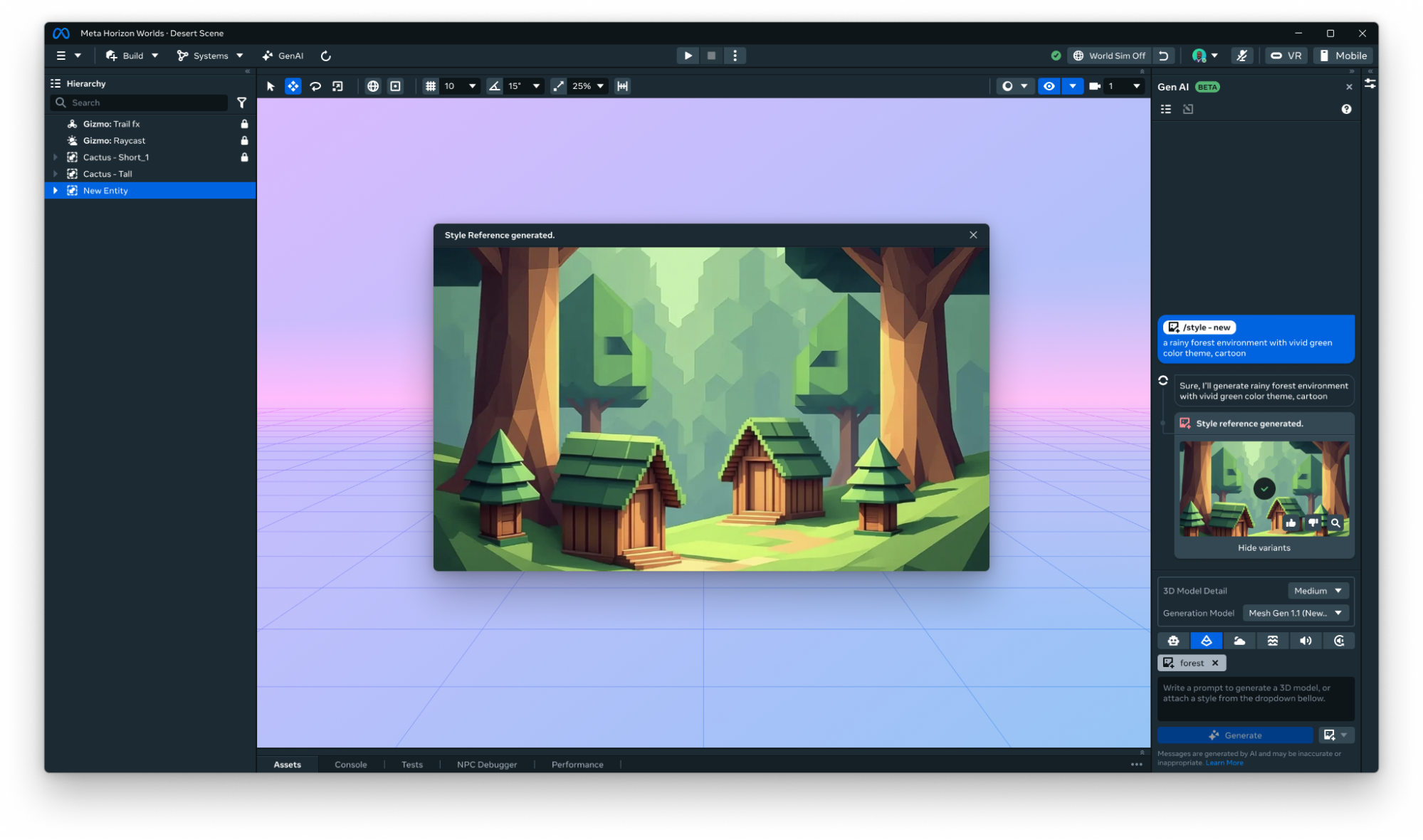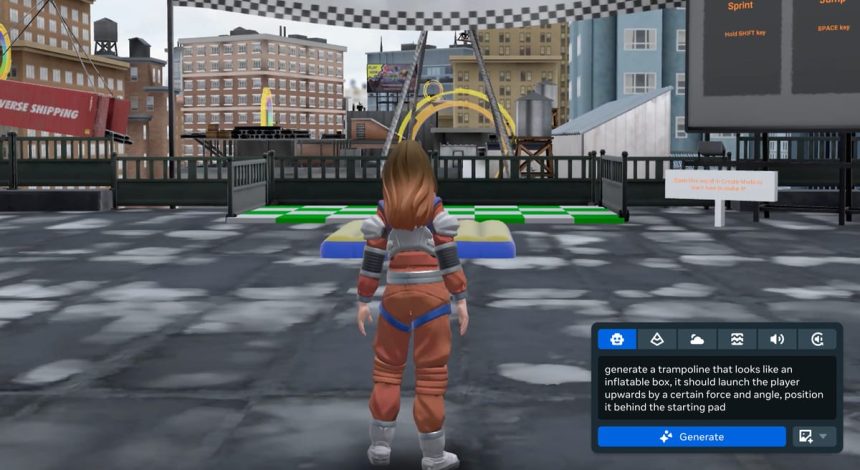Meta’s Horizon Worlds Desktop Editor includes the Creator Assistant AI agent that can perform many development tasks.
Meta criticized Horizon Worlds’ VR creation tool and launched Worlds Desktop Editor for Windows early access in February. The Worlds Desktop Editor provides the ability to import 3D assets, images, and sound files, place them in a 3D landscape, and implement game logic and other features using Typescript, a popular derivative of JavaScript.
Since its early access launch, US creators have been able to create AI-generated sound effects and ambient audio, as well as AI-generated typescripts to add functionality. In April, Meta significantly expanded the capabilities of Horizon’s AI generation, generating 3D meshes, textures and skyboxes for creators in the US, UK and Canada, and expanded this to Australia and New Zealand in June.
The company recently launched AISpeech NPCS at Horizon Worlds. We plan to compensate for this soon.
Meta Horizon Desktop Editor can now extend 3D assets to AI
Meta Horizon Desktop Editor now extends 3D models, textures, and skyboxes to AI, adding existing audio and typescript AI generation capabilities.
Now, Meta has launched Creator Assistant, an AI agent that can answer questions about the Horizon Desktop Editor and automate specific development tasks.
For example, if you tell the creator assistant to “Make a door that opens when a button is pressed”, Meta says that the agent will find the door and button in the asset library, place it in the world, set properties, write typescripts, and allow the button to open the door.
Below are 24 other examples of instructions that Meta can give to a Creator Assistant.
- “Build floor tiles that become active when you step on it.”
- “Create a lever that can be turned on and off.”
- “Generates coins that players can collect for points.”
- “We’ll design doors that require a key to open.”
- “We’ll create a health pack that will heal players when they’re picked up.”
- “Create a pad that teleports players to another location.”
- “Develop a platform that moves back and forth.”
- “We’ll engineer the elevators going up and down.”
- “Build a device that fires players into the air.”
- “We design rotating obstacles that will hurt players.”
- “Create a platform that falls and disappears when you step on it.”
- “Establish an area that will allow players to run faster.”
- “We’re building floors that will damage players like lava.”
- “It generates a gun that fires projectiles.”
- “Create a target that can be photographed.”
- “We create a barrel that explodes when hit.”
- “Implement a countdown timer in my game.”
- “We’ll design doors that open when players approach.”
- “Build a puzzle with pressure plates that require specific weights.”
- “Create a combination lock puzzle.”
- “Generate a box that generates random items.”
- “Implement a random iser like a rolling dice.”
- “Design a system that repeats objects.”
- “Build a dance floor with music.”
And here are four examples of questions that the company can ask you:
- “How do I create my own custom assets?”
- “How do I use Horizon animations?”
- “How do I learn typescripts?”
- “How do I implement a custom UI system in Horizon?”
The ironic limitation of Meta’s Creator Assistant is that they still can’t take advantage of other generation AI tools from Horizon Desktop Editor. This means that if you are asked to create/build/create something, you will look for an existing asset in the asset library, not a new asset.
Creator assistant in action.
The Horizon Desktop Editor is also receiving another new AI feature called Style Reference.
According to Meta, style references allow creators to generate, store, and reuse “specific styles” to achieve “consistent results” when using existing AI asset generation tools such as mesh, textures, skyboxes, SFX, and ambient audio AI generations.
Therefore, creators can make sure that these generated assets fit the theme and atmosphere they have in mind in their world and games.

However, despite repeated teases, what Meta has yet to be released is its ability to generate the whole world.
Called environmental generation, Meta will be released “soon” in June, telling its creators that it can “build the environment based on several different themes.”
If shipping technology meets the promise of meta, it can create a barrier to entry to create an interactive social VR world lower than ever before, reducing the minimum time required from hours to minutes.
Meta teases AI generations across the world of the horizon “quickly” coming
Meta Horizon Worlds Desktop Editor now “quickly” acquires AI environment generation and can generate the entire world from a text prompt to authors.

Horizon Worlds Desktop Editor is a free Windows desktop application.
Meta still runs a $50 million Meta Horizon Creator Fund to pay “fun and engaging” world creators. Here is the company’s explanation of how money is distributed.
“Every month, we pay a bonus from the Creator Fund to make fun and engaging mobile, (VR) world manufacturers.







